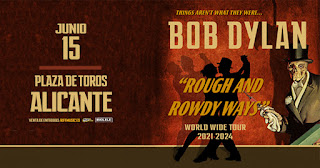Sharing the joint with young people

A couple of weekends ago, we went to the Low Festival in Benidorm. Maggie, my partner, knows that I like festivals. She doesn't. She doesn't like the push and the shove and the constant standing and, generally, the music does nothing for her. She's decided on her favourite musicians now, and she pretty much sticks with them. She doesn't discount newer stuff; it's just that, generally, she finds it falls short of her established preferences. I'm going to try to do a piece here on the accessibility of music, but I know I'm going to meander and wander around the houses. So, what I want to say is that music is very accessible in Spain. From local concerts by town bands to municipal festivals for pianists or guitarists, through any number of styles and formats of music supported by local town halls for no other reason than that they see it as their job to enrich the cultural life of their populations. In the bigger towns, small, commercial, performance spaces co...













